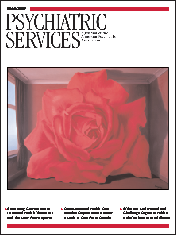Professions accrue power and prestige in proportion to their social efficacy—that is, their perceived ability to "do things" that are socially valued. Such power allows professions and the institutions they control to define social problems and their solutions in their terms. The greater a profession's perceived efficacy, the broader the domain over which it can exert control, and the more societal issues it will be asked to address.
Few professions offer better evidence of this principle than medicine. Physicians, once viewed as quacks who killed more people than they cured, by the last third of the 20th century had gained almost unrivaled social prestige and power, having demonstrated the ability to treat an expanding array of illnesses. This expanded authority led to what has been termed the "medicalization" of an ever-increasing range of physical, psychological, and even social issues (
1).
In the early 21st century the expansion of medicine's domain has taken a new turn. Whereas once it was the physician's role to define and treat disease, medicine now confronts the additional task of treating individuals' dissatisfaction with their identities—their bodies, moods, behaviors, social lives, and, indeed, "themselves." This process has not been entirely physician driven; pharmaceutical advertisements in the popular media now urge consumers to seek treatment for conditions that, although perhaps inconvenient, had not previously been identified as "medical problems." For example, television advertisements suggest that persons who formerly would have been described as "shy" actually may have social anxiety disorder and that a certain selective serotonin reuptake inhibitor may help them become the gregarious individuals they have always wanted to be. It seemed that in a society in which many once-deadly diseases are now treatable, we want "wellness" to mean not just the absence of disease but the attainment of whatever mental and physical states fit our idealized sense of ourselves.
Psychiatry has been the focus of much discourse in this area, but psychological issues are not the whole story. In his thoughtful, far-ranging book Better Than Well: American Medicine Meets the American Dream, bioethicist Carl Elliott catalogs a host of situations, both physical and psychological, in which individuals seek medical resolutions to their sense that something about who they are is unacceptable, in some cases asking medicine to make them into something that nature did not, but, at the same time, to make them feel good about who they are.
Elliott describes the quest for identity transformation, ranging from the commonplace to the highly unusual. The situations described include "nose jobs" and other essentially cosmetic interventions, as well as psychopharmacologic efforts to make shy people more gregarious and sad people more cheery. Elliott also describes individuals whose "discomfort with self" is vastly more profound. This group includes persons who believe nature has assigned them to the "wrong" biological gender and who desperately seek reassignment, as well as persons whose body image is that of an amputee and who can be made whole only through the surgical removal of a body part.
Better Than Well provides a fascinating glimpse at the demands that society will place on medicine in the coming years and at the associated discomfort with self experienced by those who will make those demands. The book is extremely well written and an enjoyable read. I recommend it to the psychiatric community, to be sure, but also to individuals in health care policy and to social scientists who are interested in the continuing evolution of medicine's role in society.

